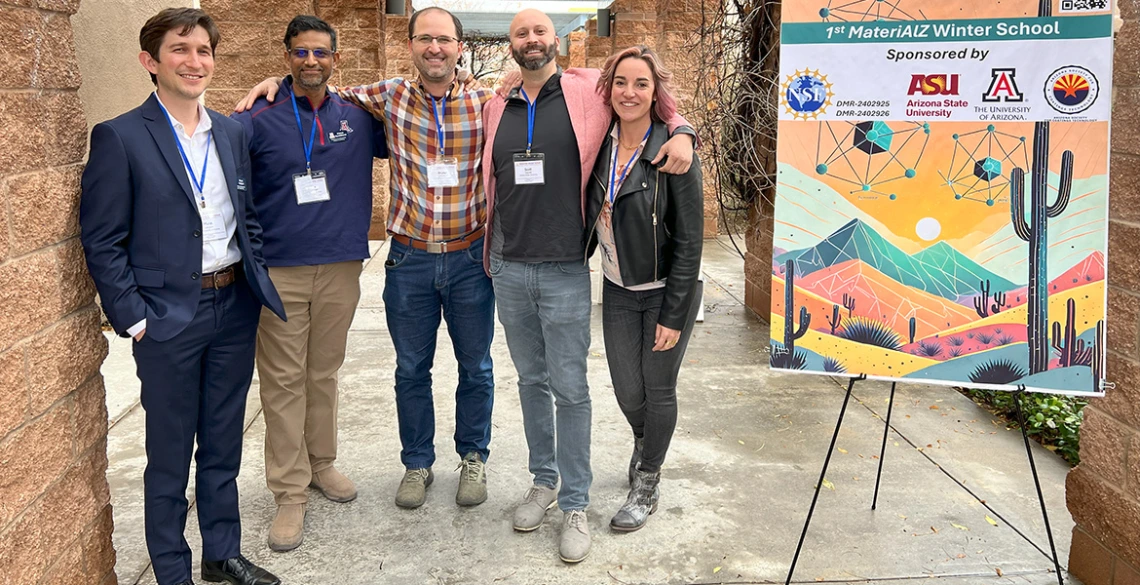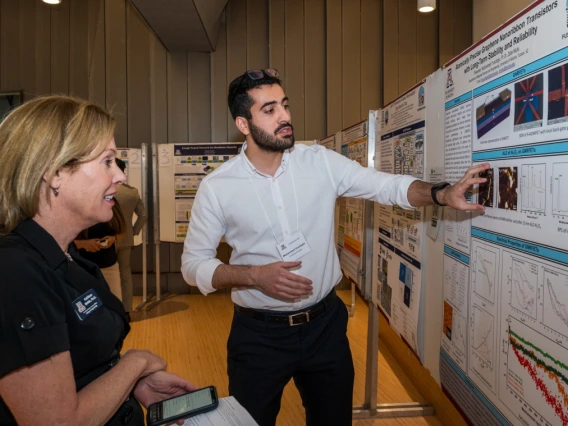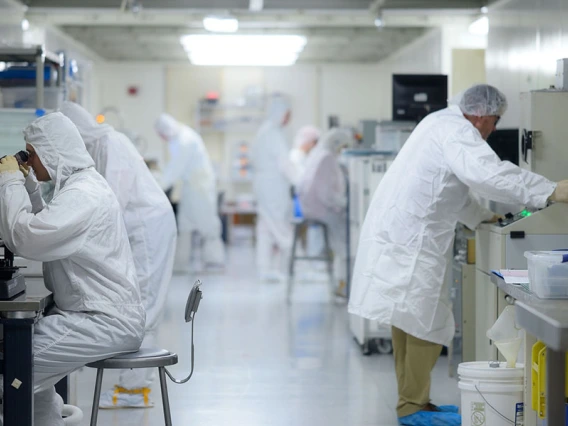MateriAlZ Winter Workshop Opens Doors to Student Success
The University of Arizona and Arizona State University collaborate on a workshop that gives undergraduates one-on-one access to industry leaders and top researchers in materials science.

Winter School organizers, from left, Marat Laypov and Krishna Muralidharan of the University of Arizona stand with Arizona State University colleagues Bruno P. Azeredo, Scott Sayres and Christina Birkel. The Winter School is a week-long workshop expanding off the MateriAlZ Seminar YouTube series created during the pandemic.
Undergraduates traveled from across the United States, converging on the Biosphere 2 research campus in January for the inaugural MateriAlZ Winter School. The week-long workshop, sponsored by the National Science Foundation and the Arizona Society for Coating Technology, was a collaborative effort between the College of Engineering and Arizona State University materials science professors.
Scientists from academia and industry gave lectures on multi-disciplinary materials science career opportunities in quantum, biomaterials, machine learning and semiconductors. Scattered between lectures were panels on career preparedness, specifically aimed at covering grant writing, self-promotion, and networking.
Krishna Muralidharan opened the gathering with an introduction to planetary materials – leftovers from the formation of the solar system like meteorites, interplanetary dust particles and samples of other planets.
“The unsung heroes of NASA space missions are the materials scientists. We are the ones analyzing the materials retrieved from space,” said the professor of materials science and engineering. “There is a huge opportunity to be hired as a materials scientist for space missions or NASA. Defense and aerospace companies are always looking for materials scientists.”
With joint appointments in planetary sciences and the Lunar and Planetary Laboratory, Muralidharan speaks from experience. As part of the Planetary Materials Research Group, he’s currently analyzing asteroid samples retrieved by NASA’s OSIRIS-REx mission with colleague Thomas Zega.
“Where there are historical boundaries between engineering and the sciences, in our group we try to remove those boundaries and say that some of the most interesting questions are at the intersection of multiple fields,” said Zega.
A Window Into the Workforce
Workshop organizer Christina Birkel, associate professor at the ASU School of Molecular Sciences, said the program has been in the works for a long time.
Birkel – in collaboration with Muralidharan; Marat Latypov, UA assistant professor of materials science and engineering; Bruno Azeredo, associate professor at ASU’s School of Manufacturing Systems and Networks; and Scott Sayres, assistant professor at ASU’s School of Molecular Sciences – wanted to plan an event that built off the success of their popular YouTube series.
The MateriAlZ seminars started during the pandemic, with a focus on spotlighting materials science academics and their research.
Birkel said she and her colleagues brainstormed on how they could do more for materials science students. The Winter School was their solution. The in-person workshop gave unfettered access to materials science opportunities, including careers outside of academia.
“At some point, you [students] will need recommendation letters or an invite to a seminar, and this is the place to do that,” said Birkel. “We want to provide a window into materials science, engineering topics and careers in academia and industry.”
The Winter School seeks to give students a glimpse into their future. Some participants, like Jasper Konda, left with a better idea of what career paths they wanted to pursue.
Networking Made Easy
Before Konda arrived at Biosphere 2, he was struggling to choose a career direction. The junior electrical engineering student from the University of New Mexico only knew that he was interested in power systems. The Winter School provided the setting for him to explore and ask questions.
“Networking, especially as an undergrad, is intimidating,” said Konda. “It’s good to be in an environment of people who have been in your shoes."
To help foster those relationships, the Winter School hosted a panel of recruiters from InteVac, the National Science Foundation, Honeywell, Raytheon and Intel. Students had the opportunity to interact with these professionals directly during the Career and Networking panel.
“Networking was a big highlight of my week,” said Konda.
Konda made connections with almost every presenter and left the Biosphere with a clearer idea of his future in materials science.
"I’m definitely leaning more toward academia, based on the conversations I had,” he said. “This field requires a lot of work, but nothing worth having comes easy.”
And Konda will not be the last student to benefit from the Winter School. Birkel plans to hold the workshop annually.



